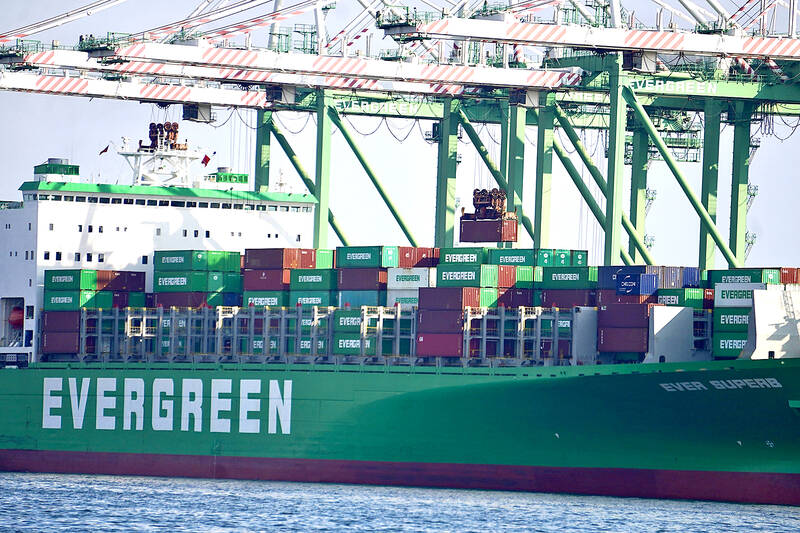Export orders expanded by 10.8 percent annually last month, the highest year-on-year growth in two years, thanks to robust demand for chips used in artificial intelligence (AI) and high-performance computing (HPC) devices mainly from Nvidia Corp, the Ministry of Economic Affairs said yesterday. It also outpaced the ministry’s upper estimate of 5.88 percent annual growth.
Export orders rose from US$42.49 billion in April last year to US$47.1 billion last month, while export orders dropped by 0.1 percent from US$47.16 billion on a monthly basis, the ministry said.
The ministry said it expects the growth momentum to carry into this month and export orders to rise between 1.8 percent and 6.2 percent annually to between US$46.5 billion and US$48.5 billion, as AI chip demand remains vigorous.

Photo: CNA
“April’s stronger performance and the growth prospects for May gave us higher confidence that export orders in the second quarter would return to growth on an annual basis, as compared with our initial estimate at the beginning of this year,” Department of Statistics Director Huang Yu-ling (黃于玲) said via telephone.
Electronic products orders soared by 22.7 percent year-on-year to US$17.1 billion last month, primarily fueled by robust demand for foundry services, chip distribution and printed circuit boards for AI-related applications and HPC devices, the ministry said. Orders from the US grew at the fastest pace of 35.8 percent.
Orders for information and communications technology products last month rose 8.4 percent annually to US$13.05 billion, backed by increased server orders on resilient demand for AI applications and cloud-based devices. Orders from Malaysia grew the highest at 53.3 percent, as manufacturers shifted production from China to the Southeast Asian country amid the US-China technology dispute.
Optoelectronics products orders expanded 13.5 percent annually to US$1.66 billion last month, attributable to increases in orders for TV panels and optoelectronic cameras. TV panel prices have also seen sustained high levels.
The price of 65-inch TV panels is to climb 1.1 percent month-on-month, or US$2 per unit, this month, extending price hikes over the past few months, market researcher TrendForce Corp (集邦科技) said yesterday.
Three major traditional sectors returned to growth last month, driven by more marked restocking demand.
Orders for basic metals, mainly for steel, rose by 3.5 percent year-on-year to US$2.23 billion last month mainly due to restocking demand, the ministry said.
Plastics product orders increased 4.2 percent annually to US$1.61 billion on inventory buildup demand, the ministry said, adding that prices were supported by higher raw material prices.
Petrochemical products orders rose by 8 percent year-on-year last month to US$1.54 billion, as OPEC increased global crude oil prices by 5.9 percent year-on-year, the ministry said.
Machinery orders shrank 3.4 percent year-on-year to US$1.59 billion last month, because increases in equipment spending from semiconductor companies were still not enough to offset the broader weakness in capacity expansion amid a slow global economic recovery, the ministry said.

SEEKING CLARITY: Washington should not adopt measures that create uncertainties for ‘existing semiconductor investments,’ TSMC said referring to its US$165 billion in the US Taiwan Semiconductor Manufacturing Co (TSMC, 台積電) told the US that any future tariffs on Taiwanese semiconductors could reduce demand for chips and derail its pledge to increase its investment in Arizona. “New import restrictions could jeopardize current US leadership in the competitive technology industry and create uncertainties for many committed semiconductor capital projects in the US, including TSMC Arizona’s significant investment plan in Phoenix,” the chipmaker wrote in a letter to the US Department of Commerce. TSMC issued the warning in response to a solicitation for comments by the department on a possible tariff on semiconductor imports by US President Donald Trump’s

‘FAILED EXPORT CONTROLS’: Jensen Huang said that Washington should maximize the speed of AI diffusion, because not doing so would give competitors an advantage Nvidia Corp cofounder and chief executive officer Jensen Huang (黃仁勳) yesterday criticized the US government’s restrictions on exports of artificial intelligence (AI) chips to China, saying that the policy was a failure and would only spur China to accelerate AI development. The export controls gave China the spirit, motivation and government support to accelerate AI development, Huang told reporters at the Computex trade show in Taipei. The competition in China is already intense, given its strong software capabilities, extensive technology ecosystems and work efficiency, he said. “All in all, the export controls were a failure. The facts would suggest it,” he said. “The US

The government has launched a three-pronged strategy to attract local and international talent, aiming to position Taiwan as a new global hub following Nvidia Corp’s announcement that it has chosen Taipei as the site of its Taiwan headquarters. Nvidia cofounder and CEO Jensen Huang (黃仁勳) on Monday last week announced during his keynote speech at the Computex trade show in Taipei that the Nvidia Constellation, the company’s planned Taiwan headquarters, would be located in the Beitou-Shilin Technology Park (北投士林科技園區) in Taipei. Huang’s decision to establish a base in Taiwan is “primarily due to Taiwan’s talent pool and its strength in the semiconductor

French President Emmanuel Macron has expressed gratitude to Hon Hai Precision Industry Co (鴻海精密) for its plan to invest approximately 250 million euros (US$278 million) in a joint venture in France focused on the semiconductor and space industries. On his official X account on Tuesday, Macron thanked Hon Hai, also known globally as Foxconn Technology Group (富士康科技集團), for its investment projects announced at Choose France, a flagship economic summit held on Monday to attract foreign investment. In the post, Macron included a GIF displaying the national flag of the Republic of China (Taiwan), as he did for other foreign investors, including China-based